Share
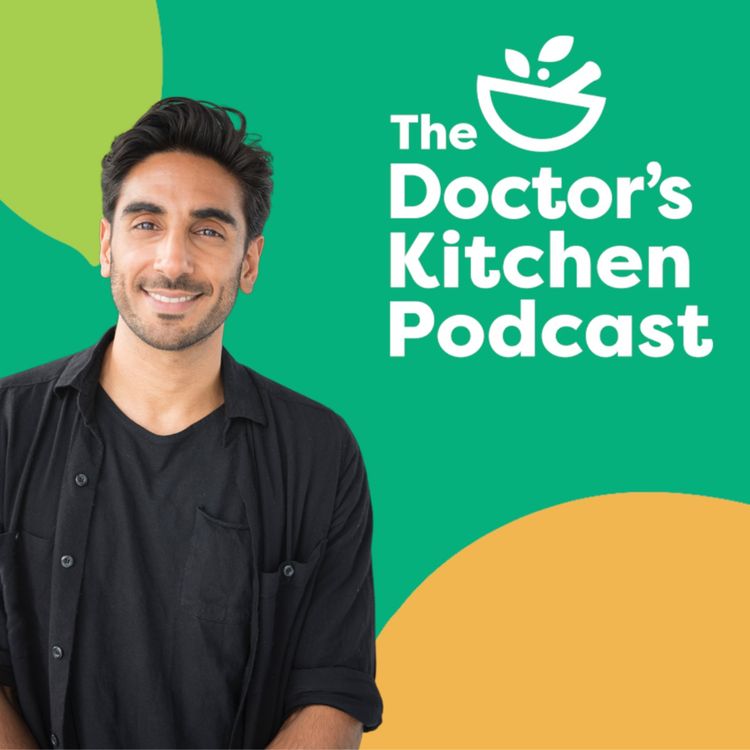
The Doctor's Kitchen Podcast
#113 FAT and the Wonderful World of this Secret Organ with, Prof Liesbeth van Rossum & Dr Mariette Boon
Fat! This curious, wonderful and often misunderstood organ is the subject of today’s podcast with Professor Liesbeth van Rossum, MD PhD and Dr Mariëtte Boon MD PhD authors of the incredible book “Fat. The Secret Organ”. And yes it is an organ.
Professor Liesbeth van Rossum, MD, PhD is internist-endocrinologist at the Erasmus University Medical Center, Rotterdam. She is co-founder of the Obesity Center CGG, and has an internationally leading position in the field of obesity and biological stress research.
Dr Mariëtte Boon, MD, PhD is an internal medicine specialist in training. Her research, per- formed at the Leiden University Medical Center, focuses on fat metabolism.
Today’s pod is a whirlwind of a conversation running through a fantastic variety of topics all to do with fat. You’ll learn about:
- Why fat is an organ
- What mechanisms drive hunger and satiety
- Why too little as well as too much fat can be detrimental
- How you can stimulate your satiety to eat less
- How stress can cause fat
- The number and size of fat cells and if they change throughout your life
- Why liposuction doesn’t work
- What brown fat is and how to increase it
- Fat on inflammation, immune health and fertility
- The 6 categories of what causes weight gain from genetics and sleep to food and stress
- If a virus can cause obesity?
Their book “Fat. The Secret Organ” is a must read for anyone as interested in this subject. We didn’t get time to properly dive deep into some other topics in the book, such as the evidence based lifestyle recommendations and how you can use simple hacks to increase metabolism as well as nutrition, so do grab a copy. I highly recommend it!
More episodes
View all episodes
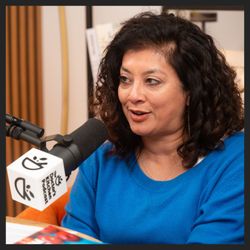
#332 How Eating Local, Organic food Is Best for Environmental Health | Mallika Basu
01:23:06|What we eat isn’t just about taste or health, it’s shaped by a powerful global system that connects farmers, supermarkets, climate, and culture.This week I’m joined by Mallika Basu, food writer, consultant and author of the new book ‘In Good Taste’, to unpack how our everyday food choices link to much bigger issues from biodiversity loss to culture, inequality and the economy.But this is a conversation about sustainable eating from a food lover's perspective.You’re going to find out …🐟 Why I may have to adjust my fish eating habits to avoid or reduce salmon 🍅 How traditional diets are climate friendly, and delicious! 🌱 Whether regen and organic farming is worth itThis is a conversation about how we can all influence the future of food through our choices and our love of cooking.🎬 Watch the podcast on YouTube here📱 Download The Doctor’s Kitchen app🌐 View full show notes, including guest details, on our website☕️ Try Exhale Coffee here🥗 Join the newsletter and receive a 7 day meal plan📷 Follow on Instagram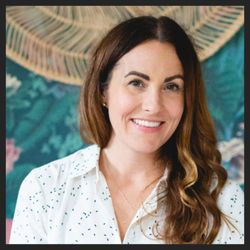
#331 Should We Avoid Fluoride and Is Mouthtaping Actually Worth It? | Dr Staci Whitman
01:42:25|Your mouth isn’t separate from the rest of your body, it’s a key part of your airway, your microbiome, and even your inflammation levels. In this episode, I’m joined by Dr Staci Whitman, functional dentist, to explore the everyday habits and products that can make a real difference to oral and whole-body health.We talk through mouth taping and why nasal breathing matters for oral health, sleep quality, and overall physiology. Who should avoid mouth taping, and safer options.How chronic mouth breathing affects dry mouth and the oral microbiome, gum health, cavities, bad breath, airway, sleep, and long-term facial/jaw development (especially in kids).Ancestral diets and how that plays a role in jaw development, and the dental impact of modern snack foods. Plus nutrients for dental health like vitamin D, K2, Calcium and vitamin C.And controversially we talk through fluoride in our water and toothpaste. What fluoride is used for and what the controversy tends to be about, and practical oral-health “non-negotiables” that matter alongside fluoride.Dr. Staci Whitman is a board-certified functional and integrative dentist specialising in the oral-systemic connection, how the mouth links to the gut, brain, hormones, and airway health. She’s the founder of Bloom Kids (a leading functional paediatric dental practice), co-founder of the Institute for Functional Dentistry, and co-founder of Fygg, a microbiome-friendly oral care line.🎬 Watch the podcast on YouTube here📱 Download The Doctor’s Kitchen app🌐 View full show notes, including guest details, on our website☕️ Try Exhale Coffee here🥗 Join the newsletter and receive a 7 day meal plan📷 Follow on Instagram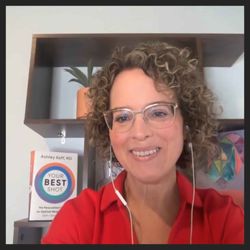
#330 GLP-1s. Everything You Need to Know | Ashley Koff, RD
01:59:46|I don’t think GLP-1 meds are the answer for everyone, but I also don’t think they’re the villain of the story. For many people they can be genuinely life-changing, when they’re used with the right support. So this episode is for anyone who’s made that decision (or is seriously considering it) and wants to do it safely, sustainably, and with as much information as possible. -I can’t stop you from taking these medications, but I can help you be informed: what to ask, what to monitor, what to eat, and how to protect your muscle, gut, and long-term health along the way.Today’s episode is all about one of the biggest health conversations happening right now: GLP-1 medications.I’m joined by Ashley Koff, RD, to give you the straight dope on what’s really going on beneath the surface: why so many of us are struggling with food noise, why some people never reach that “80% full” feeling, and what it means when your metabolic switches (the appetite and satiety systems that should be working in the background) aren’t firing properly.We break down GLP-1s, starting with what happens in an optimally functioning body: the roles of hormones like GLP-1, GIP, PYY and CCK, and how they influence hunger, fullness, blood sugar, and cravings. We also talk through what side effects might be telling you, what to monitor if you do choose medication, and whether supplements have a role — including the so-called “GLP-1 boosters” you’ll see everywhere.Most importantly, this episode is for anyone who wants lasting fat loss and better metabolic health, with or without drugs.Ashley Koff is a registered dietitian and founder of the Better Nutrition Program, and she trains clinicians as course director for UC Irvine’s Integrative & Functional Medicine Fellowship. She’s also the author of the upcoming book ‘Your Best Shot’.🎬 Watch the podcast on YouTube here📱 Download The Doctor’s Kitchen app🌐 View full show notes, including guest details, on our website☕️ Try Exhale Coffee here🥗 Join the newsletter and receive a 7 day meal plan📷 Follow on Instagram
#329 Is My Wife’s 10-step Morning Wellness Routine Worth It?
01:28:17|I’m seeing “perfect” wellness routines everywhere! Red light masks, infrared saunas, ice baths, supplements lined up on the kitchen counter, breathwork, journaling, grounding mats… the list goes on.And yes, my wife has been trying most of them.So today, we’re doing something a bit different. We’re recreating those little “sofa consults” we have at home. We’ll be casually watching TV, and out of nowhere she pauses the show, turns to me dead seriously, and hits me with a question like…“Babe… what are your thoughts on grounding mats?”So the format is simple: she’s going to take us through her wellness routine from morning to night, and after each bit she’ll ask me what I think.I’ll give it a verdict, the why behind it, and a quick takeaway you can actually use, so you can make a choice as to whether you want it in your routine or not.If you liked this episode let me know by leaving a comment on Spotify, or shooting us a message on instagram. I’ll be watching out for them! 🎬 Watch the podcast on YouTube here📱 Download The Doctor’s Kitchen app🌐 View full show notes, including guest details, on our website☕️ Try Exhale Coffee here🥗 Join the newsletter and receive a 7 day meal plan📷 Follow on Instagram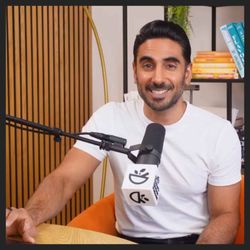
#328 5 things I changed this year because of the podcast | Dr Rupy Aujla
57:43|In 2025 we’ve had world experts come into the DK studio, meet the team, sit right here in this room and let me tease their brains, challenge their ideas and help us bring you the most up-to-date, practical advice out there.These guests changed the way I personally eat, the way I move, the way I recover, the way I think and even the way I structure my day.So in today’s episode, I want to share the 5 health habits I changed this year because of this very podcast you're listening to, because I’m on this journey with you.I’ll talk about my changing perspectives on:Red Meat and whether you can safely eat it regularly or not?How to consume more variety of fibreWhy movement snacking is just as important as structured workoutsIf sauna is worth it and what an evidence based protocol looks likeHow to reduce screen time and improve your dopamine levels🎬 Watch the podcast on YouTube here📱 Download The Doctor’s Kitchen app🌐 View full show notes, including guest details, on our website☕️ Try Exhale Coffee here🥗 Join the newsletter and receive a 7 day meal plan📷 Follow on Instagram
#327 Constipation 101: Everything You Need to Know About Keeping Your Digestive System Working with a Gastroenterologist | Consultant Dr Angad Dhillon
01:50:39|Constipation might not sound like the most glamorous topic, but it’s one of the most common and overlooked health issues in the UK. Around 1 in 7 adults and up to 1 in 3 children experience it, and it’s responsible for thousands of hospital admissions every year.This week I’m joined by Dr Angad Dhillon, Consultant Gastroenterologist and accredited Bowel Cancer Screening endoscopist at Lewisham and Greenwich NHS Trust. With advanced training from St Mark’s Hospital, one of the world’s leading centres for intestinal disorders, Dr Dhillon specialises in complex endoscopy, bowel health, and digestive wellbeing. He also happens to be my best friend from medical school who I’ve literally known over 2 decades!We talk about lesser known constipation strategies, what functional constipation means, how it can be related to other medical issues and what you should be optimising before you reach for a laxative, medications or supplements.Today we explore: 💬 What “normal” bowel habits look like and whether the bristol stool chart is useful 🥦 How to approach constipation with a dietary approach 🧘♂️ Why pooping posture, breathing, and stress matter for gut health 🌙 The link between sleep, circadian rhythm, and digestion ⚠️ Red flags that mean it’s time to speak to your doctorDr Dhillon's research work can be found here and give him a follow on social media @the_gut_doctor🎬 Watch the podcast on YouTube here📱 Download The Doctor’s Kitchen app🌐 View full show notes, including guest details, on our website☕️ Try Exhale Coffee here🥗 Join the newsletter and receive a 7 day meal plan📷 Follow on Instagram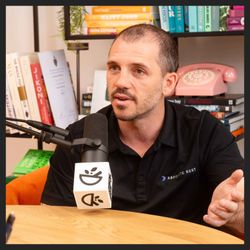
#326 The Most Powerful Drug on the Planet (Exercise) and How to Use It Daily | with Professor Andy Galpin, PhD
02:21:03|If exercise were a pill, it would be the most powerful drug on the planet. It protects the brain, lowers the risk of heart disease and Alzheimer’s, reduces stress, boosts energy… and yet, most of us still struggle to fit it in.Today, we’re putting together a practical, evidence-based guide to exercise for everyone. If you’re a busy parent or professional who struggles to find the time to move, we’ll show you the minimum that makes the biggest difference. If you’re older and thinking about healthy ageing, we’ll talk about protecting bone, muscle and independence as well as how to approach going to an intimidating weight section of a gym for the first time.For teens and young people, we’ll cover how movement shapes brain health and sets you up for life. And if you’re already into fitness, we’ll dive into how to break plateaus, track progress, and optimise performance. This episode will show you exactly how to move for a longer, healthier life.Today I’m joined by Dr Andy Galpin, one of the world’s leading human performance scientists and the person I wish I’d had on speed dial when I first started trying to figure out how to train smart, not just hard.Andy is a Professor at Parker University and Executive Director of the Human Performance Center. He holds a PhD in Human Bioenergetics, has published over 100 peer-reviewed papers, and has worked with some of the most elite athletes on the planet — from Olympic gold medallists to world champions across the UFC, MLB, NBA, NFL, PGA, and military special forces.He’s also the co-founder of several innovative companies, including Absolute Rest, Vitality Blueprint, and BioMolecular Athlete, all dedicated to improving human health, performance, and recovery.Think of this episode like a session with Andy … but for all of us! By the end, you’ll have a clear, evidence-based understanding of how to use exercise to support your health at any stage of life. Whether you’re a busy parent, professional, or already fit and active, Andy helps us understand what most people are missing from their training and how to fill those gaps.We cover: 💪 The exercise priorities for each stage of life, from teenagers to older adults 🧬 How to personalise training using intensity, timing, and recovery data 🦴 Why bone health matters more than you think and what to do about it ⚡ The key markers for long-term fitness and how to track real progressMy hope is that this is one of those conversations that reframes how you think about movement not just for performance, but for longevity, energy, and quality of life.🎬 Watch the podcast on YouTube here📱 Download The Doctor’s Kitchen app🌐 View full show notes, including guest details, on our website☕️ Try Exhale Coffee here🥗 Join the newsletter and receive a 7 day meal plan📷 Follow on Instagram
#325 10 Anti-Inflammatory Foods to Feel Better, Support Your Gut and Cut Your Risk of Disease | Dr Rupy Aujla
01:16:04|Since writing about inflammation in Eat to Beat Illness and my last book Healthy High Protein, I’ve become fascinated by how this one process connects so many of the health issues I’ve seen in thousands of patients over my career.On the one hand, inflammation is brilliant, it helps us fight infections, repair injuries, and clear out damaged or cancerous cells. But when it doesn’t switch off or is constantly triggered, it becomes a slow burn in the background, driving heart disease, cancer, dementia, and even daily struggles like joint pain, gut problems, poor sleep, skin issues, and fatigue.The good news? Food gives us a direct way to influence it. Every time we sit down to eat, we can either fan the flames or gently cool them.In this episode, we explore: 🧬 What inflammation actually is (and the early warning signs of too much) 🥗 The science and benefits of an anti-inflammatory diet 🥑 My top 10 anti-inflammatory foods you can start eating today 🥩 Controversial takes on meat, dairy, and foods to limit 📊 How we measure inflammation, including our new “inflammation score” on the appThis is your practical guide to cooling chronic inflammation and protecting your long-term health, starting with what’s on your plate.🎬 Watch the podcast on YouTube here📱 Download The Doctor’s Kitchen App - Special Black Friday Offer🌐 View full show notes, including guest details, on our website☕️ Try Exhale Coffee here🥗 Join the newsletter and receive a 7 day meal plan📷 Follow on Instagram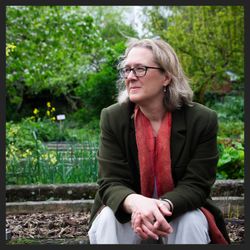
#324 Can Multivitamins Help Treat Depression, Anxiety and Prevent Mental Health Issues? | Professor Julia Rucklidge
02:34:01|Coming into this podcast my opinion was that multivitamins are just not worth it. Whether that’s for general wellbeing, cardiovascular health, sleep and especially mental health, I just was not convinced that they did anything at all.But I specifically wanted to speak with Professor Julia Rucklidge, clinical psychologist and Director of the Mental Health and Nutrition Research Lab at the University of Canterbury, because she has a very different opinion.Julia’s groundbreaking research and viral TED Talk have transformed how psychiatrists and mental health practitioners think about nutrition and mental illness, especially the potential of broad-spectrum micronutrients to support mood, focus, and resilience.We explore: 💊 Why “no single ingredient solutions” matter, and when multivitamins might actually help 🧬 How stress, inflammation, and modern farming have changed our nutrient needs🧠 The mechanisms linking nutrients, mitochondria, and neurotransmitters to mood and cognition👩🔬 The evidence for micronutrients in ADHD, PMS, Depression and Anxiety🥗 How to choose quality supplements and avoid the hypeIf you’ve ever wondered whether taking a daily multivitamin is worth it or how food and nutrients impact the brain, this episode will challenge your assumptions and expand your understanding of nutrition for mental wellbeing.Julia has made me reconsider my personal perspectives on multivitamins, and I’m excited to dive deeper into this topic on future podcasts and with our internal research team.🎬 Watch the podcast on YouTube here📱 Download The Doctor’s Kitchen app🌐 View full show notes, including guest details, on our website☕️ Try Exhale Coffee here🥗 Join the newsletter and receive a 7 day meal plan📷 Follow on Instagram